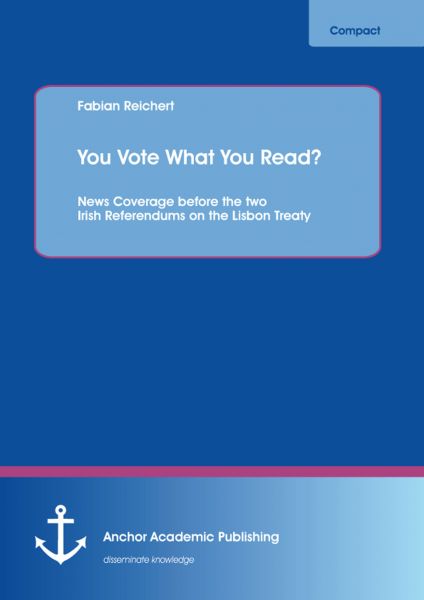You Vote What You Read? News Coverage before the two Irish Referendums on the Lisbon Treaty
News Coverage before the two Irish Referendums on the Lisbon Treaty
Eurobarometer shared recently that 41% of the EU citizens get their main information on European topics from daily newspapers. This is also the case for those citizens who decided on the adaption of the Lisbon treaty in the two nationwide referendums, in Ireland. But, as many media researchers showed, news coverage is biased. However, it has to be biased for it is simply not possible to report the entire reality in one article. One aspect of news bias is known under the term framing. Framing leads readers to think in a certain direction for journalists underline certain aspects in a news story, and usually, cover a story only from one angle. Therefore, the journalist's angle can have a high influence on the reader's opinion.
The study follows these hints and examines the news coverage before the two Irish referendums on the Lisbon treaty took place. Applying a content and framing analysis of the two most selling Irish newspapers, namely 'the Irish Times' and 'the Irish Independent', it aims to make statements about the framing of the treaty in the news, and gives evidence to the informative value of the title.
Text sample:
Chapter 2.4.2, Emphasis Framing Effect:
This type of framing effect focuses on the dominant emphasis of one issue dimension of an object. When certain frames are used during a communicative process about an object, the evaluation of the object is mainly based on these reference frames. Berelson et al. (1954: 267) find for the US presidential election campaign of 1948, that the support for Truman roses with positive relationship to the saliency of 'economic laborconsumer 'class” issues”, even among voters 'who had not previously liked him, nor did they like him even when they changed to his side”. They conclude that 'people can differ from one another, and within themselves from time to time by emphasizing different dimensions of things they perceive” (ibid. 271).
Like equivalency framing effects, emphasis framing effects direct the attention to several dimensions of an object and ignore others, but unlike equivalency framing effects the aspects are not logically identical. One cannot assume that economic policy is the logical equivalent to social policy (see Druckmann 2001: 230).
2.5, Framing EU Referendums:
What implications does this have for the role of the news coverage before the two EU referendums? First of all it is likely to assume that the framing of news coverage can have an effect on voters´ decision in referendums, also on the decisions of the Irish voters in the two referendums on Lisbon treaty. As described in chapter 2.2 there is no need to insinuate that the media has a conscious agenda because it acts as a stage for the opinion leaders in a system of discussion (Barker 1951, Downs 1957, Berelson et al. 1954).
Taking the view that the framing of a referendum has an effect on the decision of the voter it is not the crucial point to distinguish between a vote on the issue of the referendum and a vote on the domestic government (Franklin 1995, Svensson 2002). Because both alternatives just are different frames of the referendum, so to speak two sides of the same coin. They can be reduced to two different issue frames among many others possible (Marsh 2007, Garry et al. 2009, Hobolt 2006a, Berelson et al 1954, Druckmann 2001).
In chapter 2.3, I developed a typology of different concepts of the term framing. I apply a definition, which only considers communicating frames in the media (media frames). All the concepts are highly interconnected, but I only focus on the effects that media frames can have on individual decisions, so called framing effects (Bonfadelli 2002, Scheufele 2003, Entman 1993, de Vreese 2005).
Researchers already identified and successfully tested a number of framing effects, which chapter 2.4 presents. Following the typology of Druckman (2001) they are arranged into two types: Equivalency framing effects and emphasis framing effects. Three subtypes of equivalency framing effects are prescribed: Attribute framing, risky choice and goal framing framing (Levin et al. 1998). In the following two chapters (2.5.1 and 2.5.2) I formulate expectations about the framing of the Lisbon treaty in the media on the background of the described framing effects.
Fabian Reichert was born in 1985. He received his bachelor degree in politics and management from the universitiy in Konstanz and Lisbon. After he had worked in an online editorial department of a German newspaper, he left Germany to continue his university education at the Aalborg University, in Denmark where he is living and working today.
Versandkostenfreie Lieferung! (eBook-Download)
Als Sofort-Download verfügbar
- Artikel-Nr.: SW9783954895557
- Artikelnummer SW9783954895557
-
Autor
Fabian Reichert
- Wasserzeichen ja
- Verlag Anchor Academic Publishing
- Seitenzahl 42
- Veröffentlichung 01.06.2013
- ISBN 9783954895557

